Present Value Formula for Continuous Compounding
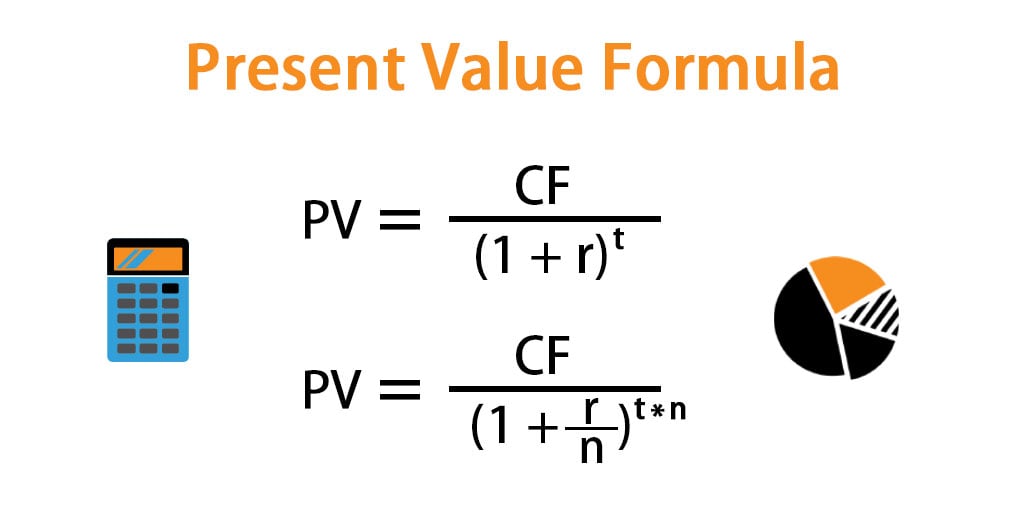
Present Value Formula (Table of Contents)
- Formula
- Examples
- Calculator
What is the Present Value Formula?
The term "present value" refers to the application of time value of money that discounts the future cash flow to arrive at its present-day value. The discounting rate used for the present value is determined based on the current market return. The formula for present value can be derived by discounting the future cash flow by using a pre-specified rate (discount rate) and a number of years.
Formula For PV is given below:
PV = CF / (1 + r) t
Where,
- PV = Present Value
- CF = Future Cash Flow
- r = Discount Rate
- t = Number of Years
In case of multiple compounding per year (denoted by n), the formula for PV can be expanded as,
PV = CF / (1 + r/n) t*n
Examples of Present Value Formula (With Excel Template)
Let's take an example to understand the calculation of the Present Value in a better manner.
You can download this Present Value Formula Excel Template here – Present Value Formula Excel Template
Example #1
Let us take a simple example of $2,000 future cash flow to be received after 3 years. According to the current market trend, the applicable discount rate is 4%. Calculate the value of the future cash flow today.
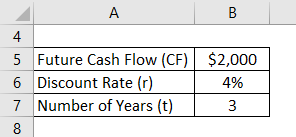
Solution:
Present Value is calculated using the formula given below
PV = CF / (1 + r) t
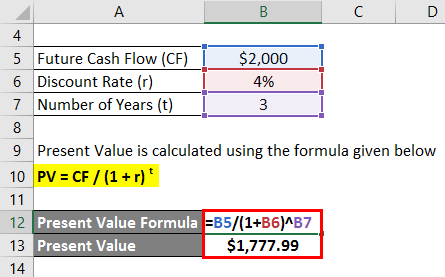
- Present Value = $2,000 / (1 + 4%) 3
- Present Value = $1,777.99
Therefore, the $2,000 cash flow to be received after 3 years is worth $1,777.99 today.
Example #2
Let us take the example of David who seeks to a certain amount of money today such that after 4 years he can withdraw $3,000. The applicable discount rate is 5% to be compounded half yearly. Calculate the amount that David is required to deposit today.
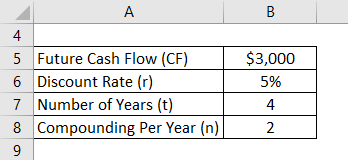
Solution:
Present Value is calculated using the formula given below
PV = CF / (1 + r/n) t*n
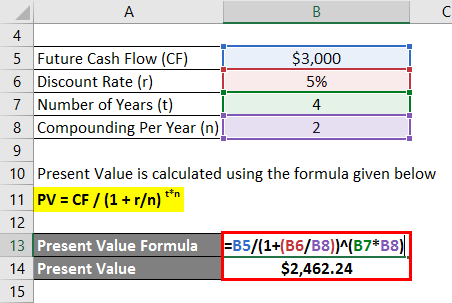
- Present Value = $3,000 / (1 + 5%/2) 4*2
- Present Value = $2,462.24
Therefore, David is required to deposit $2,462 today so that he can withdraw $3,000 after 4 years.
Example #3
Let us take another example of John who won a lottery and as per its terms, he is eligible for yearly cash pay-out of $1,000 for the next 4 years. The discount rate is 4%. Calculate the present value of all the future cash flows starting from the end of the current year.
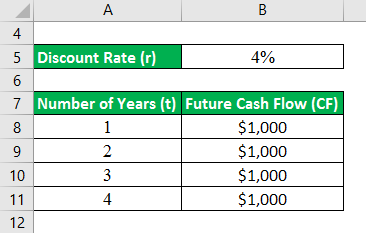
Solution:
Present Value is calculated using the formula given below
PV = CF / (1 + r) t
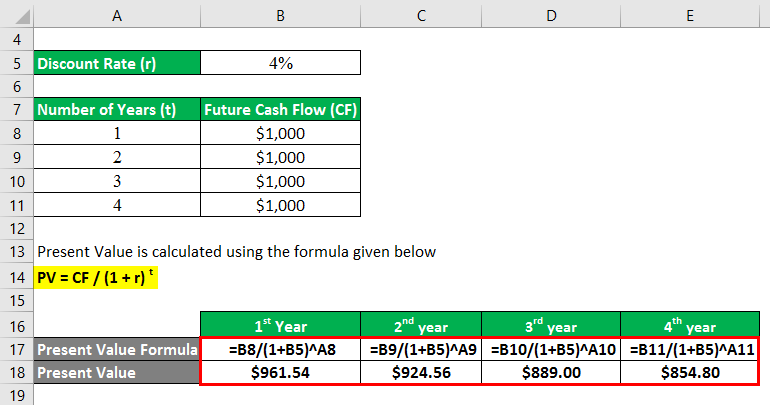
For 1st Year,
- Present Value = $1,000 / (1 + 4%)1
- Present Value = $961.54
For 2nd Year,
- Present Value = $1,000 / (1 + 4%)2
- Present Value = $924.56
For 3rd year,
- Present Value = $1,000 / (1 + 4%)3
- Present Value = $889.00
For 4th year,
- Present Value = $1,000 / (1 + 4%)4
- Present Value = $854.80
Present Value for all the year is calculated as:
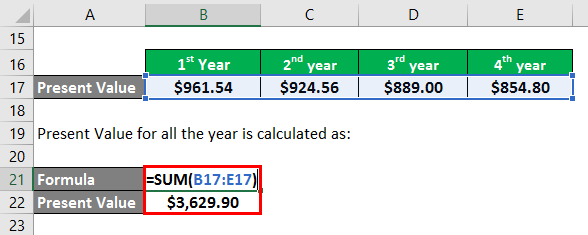
- Present Value= $961.54 + $924.56 + $889.00 + $854.80
- Present Value = $3,629.90
Therefore, the present-day value of John's lottery winning is $3,629.90.
Explanation
The formula for the present value can be derived by using the following steps:
Step 1: Firstly, figure out the future cash flow which is denoted by CF.
Step 2: Next, decide the discounting rate based on the current market return. It is the rate at which the future cash flows are to be discounted and it is denoted by r.
Step 3: Next, figure out the number of years until the future cash flow starts and it is denoted by t.
Step 4: Finally, the formula for present value can be derived by discounting the future cash (step 1) flow by using a discount rate (step 2) and a number of years (step 3) as shown below.
PV = CF / (1 + r) t
Step 5: Further, if the number of compounding per year (n) is known, then the formula for present value can be expressed as,
PV = CF / (1 + r/n) t*n
Relevance and Uses
The concept of present value is primarily based on the time value of money which states that a dollar today is worth more than a dollar in the future. However, there is a limitation of present value calculation as it assumes that the same rate of return would be earned over the entire period of time – no rate of return can be guaranteed for any investment as various market factors can impact the rate of return negatively resulting in erosion of the present value. As such, the assumption of an appropriate discount rate is all the more important for correct valuation of the future cash flows.
Present Value Formula Calculator
You can use the following Present Value Calculator
Recommended Articles
This is a guide to Present Value Formula. Here we have discussed How to Calculate Present Value along with practical examples. We also provide a Present Value Calculator with a downloadable excel template. You may also look at the following articles to learn more –
- Guide to Present Value Factor Formula
- Examples of Variance Analysis Formula
- How to Calculate Sample Standard Deviation?
- Population Variance Formula with Excel Template
Source: https://www.educba.com/present-value-formula/
0 Response to "Present Value Formula for Continuous Compounding"
Post a Comment